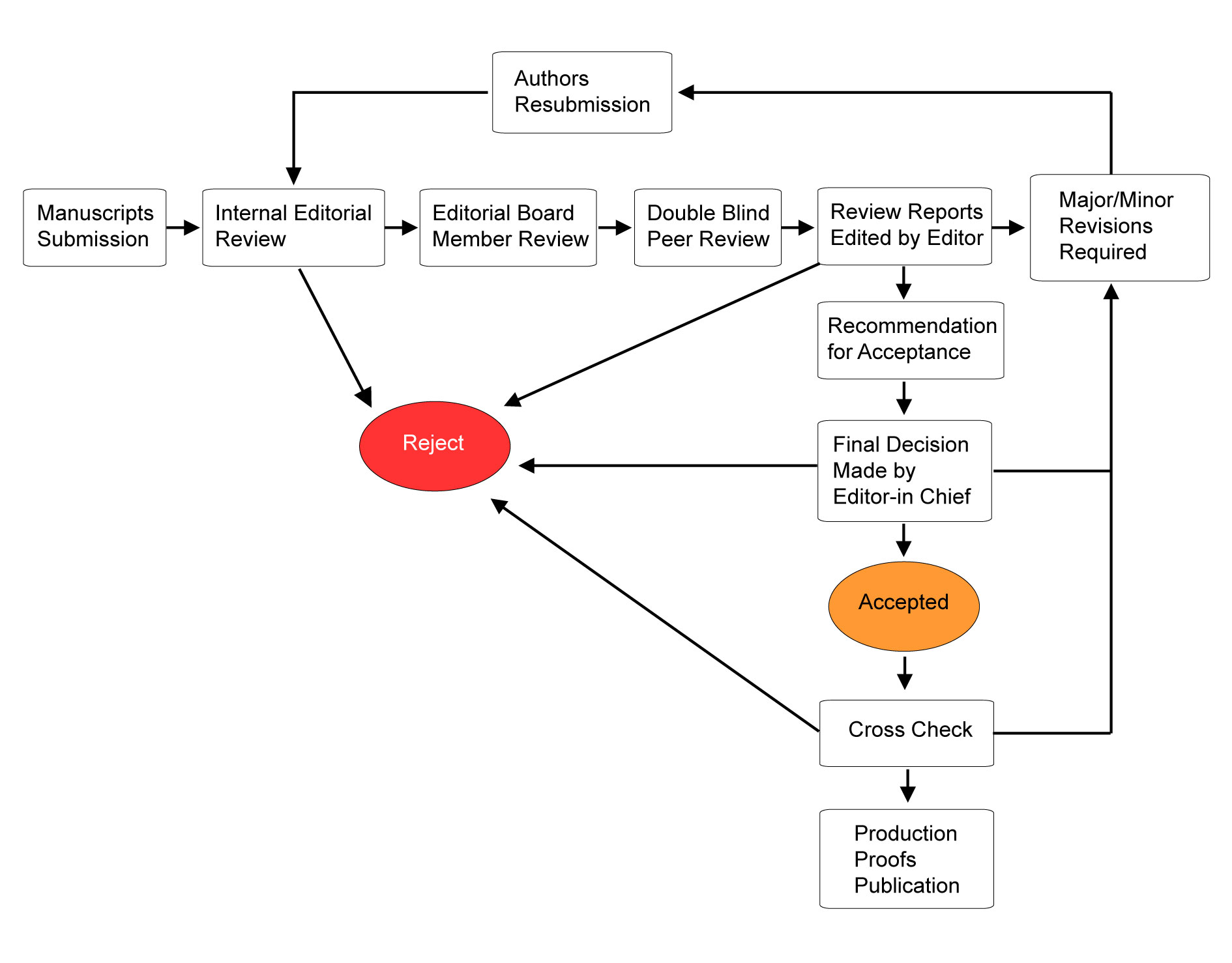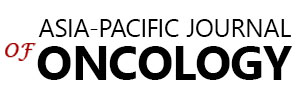Editorial Workflow
The single-blind peer review process is commonly used by Asia-Pacific Journal of Oncology (AJO). Each Editorial Board Members shall organize and conduct a thorough peer review of submissions, including the scope and quality of the submissions.
1. Review in advance
Once a manuscript is submitted for publication, the editorial department carefully and thoroughly reviews the manuscript to ensure that it is suitable for peer review.
2. Executive Editor or Editor-in-Chief review
Upon completion of the preliminary review, the manuscript will be sent to the journal's executive editor for review.
A) If, in the opinion of the Executive Editor, the manuscript is of insufficient quality to pass the normal review process, or if the subject matter of the manuscript is inconsistent with the scope of the Journal, the Executive Editor reserves the right to reject the manuscript without further processing.
B) If the Executive Editor considers the submitted manuscript to be of sufficient quality and within the scope of the journal, the manuscript will be assigned to an Editorial Board Member who is familiar with the subject matter of the manuscript.
Note: If the manuscript is written by the Executive Editor, the manuscript will be processed and checked by the Editors-in-Chief and vice versa.
3. Peer review
AJO typically uses a single-blind peer review process.
External reviewers may or may not be from a list of potential reviewers recommended by the author. Designated Editorial Board Member reviewers may select at least two reviewers for a particular manuscript based on the designated reviewer's knowledge and experience.
The review report provides Editors with feedback on the quality of the manuscript. It also provides authors with clear insights on how to improve a paper to make it suitable for publication in a journal. While editors' confidential comments will not be forwarded to the author, any comments that may help improve the quality of the manuscript will be forwarded to the author for their consideration. In the evaluation report, the reviewer should provide comments on the following points:
A) Is the text comprehensive enough for people to understand? If not, how can it be improved?
B) Does the declaration provide sufficient evidence?
C) Did the authors do justice to previous findings?
D) Does the paper provide enough methodological detail to reproduce the experiment?
AJO encourages authors to post detailed protocols online as supporting information. Are specific methods, such as protocols, used in the manuscript?
Reviewers are expected to provide their reports in a timely manner within two weeks, as timely reviews have many benefits, such as leading to timely publication of the manuscript, which benefits both the author and the scientific community.
Reviewers submit their reports on the manuscript to the designated Editorial Board Member along with their recommendations for one of the following actions:
1) Accept Submission
2) Major/Minor Revisions Required
3) Decline Submission
4. Editorial decision
If the comments contain confidential information, the review report is edited by the Executive Editor. Reviewers should include these comments in the confidential section of the review form, which is for editors only. If the quality of the reviewer's report does not meet the requirements, the Executive Editor reserves the right to request the Editorial Board Member to add reviewers.
5. When all reviewers have submitted their reports, the Executive Editor may make one of the following editorial recommendations to the Editor-in-Chief:
1) Accept Submission
2) Major/Minor Revisions Required
3) Decline Submission
If the Executive Editor recommends "Accept Submission", the Editor-in-Chief is notified to check the manuscript and review report. The Editor-in-Chief may overrule the Executive Editor's recommendation (in which case the manuscript is rejected) or approve the Executive Editor's recommendation (in which case the manuscript is accepted for publication).
If the Executive Editor suggests that "Major/Minor Revision Required" the suggestion is communicated to the author. The author should revise the manuscript according to the reviewer's suggestion and submit the revised manuscript in time. Once a revised manuscript has been submitted, the original reviewer is contacted to request a review of the revised manuscript. When submitting the review report, the reviewer will also put forward suggestions of "Accept Submission", "Revisions Required" or "Decline Submission". The Executive Editor can then make an editing recommendation, which can be either "Accept Submission" or "Revisions Required" or "Decline Submission". If the Executive Editor recommends rejection, it will be done immediately. In addition, if two reviewers recommend rejection of the manuscript, it is immediately rejected.
The editorial workflow gives the Executive Editor the power to reject any manuscript because of its inappropriate subject matter, lack of quality, or incorrect results; It also gives the Executive Editor similar authority over manuscripts assigned to them by the Editor-in-Chief. However, only the Editor-in-Chief can approve manuscripts for publication, and the Executive Editor recommends manuscripts to the Editor-in-Chief for acceptance. Proposals for employment must be approved by the Editor-in-Chief before publication. The Executive Editor cannot designate himself as a reviewer for the manuscript. This is to ensure that every manuscript submitted to AJO has a high quality, fair and impartial peer review process, as any manuscript must be recommended by one or more (usually two or more) external reviewers, an Executive Editor and the Editor-in-Chief before being accepted for publication.
 Editorial Workflow
Editorial Workflow
AJO respects the request that manuscripts not be peer-reviewed by experts who may have competing interests with the authors of the submitted manuscripts. Editors can not keep track of all the competing interests; Therefore, if reviewers identify any potential competing interests during the review process, we expect them to notify the Editor-in-Chief or Executive Editor. In addition, if a reviewer has a conflict of interest in reviewing a manuscript submitted by any author/contributor to the manuscript, the reviewer should notify the Editors or editorial department of the journal.
Special Issues (SIs) are collections of papers on a topic of special interest, organized and led by experts on that subject who serve as Guest Editor of the Special Issue. All submitted papers follow the same peer review process as regular papers. All papers will be submitted through the journal's online submission system, and Guest Editor and invited authors must strictly adhere to the Editorial Policies of all journals.

 Submit Manuscript
Submit Manuscript